| Srl | Item |
| 1 |
ID:
089568
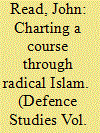

|
|
|
| 2 |
ID:
089566
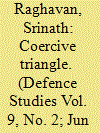

|
|
|
| 3 |
ID:
089567
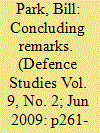

|
|
|
| 4 |
ID:
089565


|
|
|
| 5 |
ID:
089562
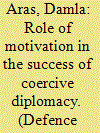

|
|
|
|
|
| Publication |
2009.
|
| Summary/Abstract |
Understanding the nature of state motivation in sponsoring non-state armed groups is of great significance to the countries countering these sponsor-states. An analytical understanding of this phenomenon entails comprehending its characteristics which is translated as its strength. Such an understanding is crucial because several coercing countries have failed to persuade their opponents, due to their strength of motivation, to comply with their demands despite their military superiority. Given the increasing number of states using coercive strategies, developing realistic and effective strategies by understanding the opponent's motivation becomes all the more important. Despite its importance, although there are studies examining the underpinnings of the motivations of non-state armed groups, only a few studies analyse the polymorphous character of the sponsor-state's motivations, let alone its impact on the outcome of the coercing state's strategies.1
|
|
|
|
|
|
|
|
|
|
|
|
|
|
|
|
| 6 |
ID:
089564


|
|
|
|
|
| Publication |
2009.
|
| Summary/Abstract |
Understanding the nature of state motivation in sponsoring non-state armed groups is of great significance to the countries countering these sponsor-states. An analytical understanding of this phenomenon entails comprehending its characteristics which is translated as its strength. Such an understanding is crucial because several coercing countries have failed to persuade their opponents, due to their strength of motivation, to comply with their demands despite their military superiority. Given the increasing number of states using coercive strategies, developing realistic and effective strategies by understanding the opponent's motivation becomes all the more important. Despite its importance, although there are studies examining the underpinnings of the motivations of non-state armed groups, only a few studies analyse the polymorphous character of the sponsor-state's motivations, let alone its impact on the outcome of the coercing state's strategies.1
|
|
|
|
|
|
|
|
|
|
|
|
|
|
|
|
| 7 |
ID:
089560
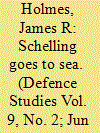

|
|
|
|
|
| Publication |
2009.
|
| Summary/Abstract |
China has geared its diplomatic and military endeavors since the 1995-96 Taiwan Strait crisis primarily to discouraging the United States(US) from getting involved in a cross-strait war.By constructing combat systems able to hold US naval assets at risk in Asia, and by telegraphing the inportance it attaches to resuming control of Taiwan, Beijing hopes to induce Washington to stand aside or, at a minimum, to hesitate long enough for the Chinese military to accomplish its goals on the island.
|
|
|
|
|
|
|
|
|
|
|
|
|
|
|
|